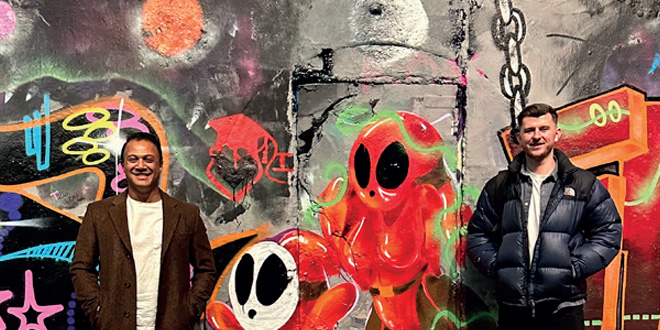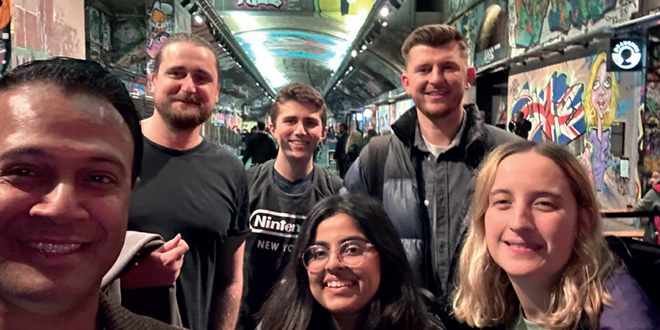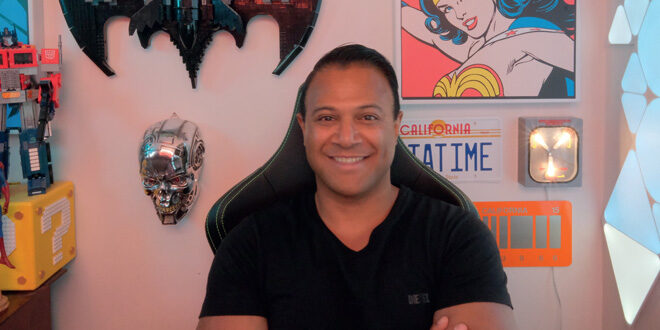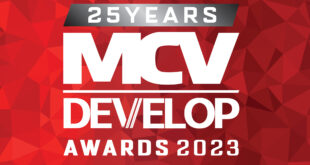Hatched during lockdown, Raptor PR has quickly found its happy hunting ground in B2B comms for games industry and media brands. Richie Shoemaker speaks to founder Rana Rahman about what the agency might get its teeth into next.
A wide-eyed, ebullient love of games is not something that is all that common in the UK games industry – at least not the circles MCV tends to frequent. Sure, some will share their excitement over the release of a new Pokémon game, or berate the direction of travel for the latest Sonic, but we mainly find that many that have long made games their business have seemingly been conditioned to keep their gamer credentials out of sight and their passions muted.
Not so Rana Rahman. As soon as our call to the founder and CEO of Raptor PR begins, there are no ambiguities about where his interests lay. The room from where he conducts his hybrid business is more like a streaming teenager’s bedroom than the sober workspace of a businessperson – a legacy of creating a gamified brand in the midst of lockdown which has become Rahman’s calling card. Carefully framed is Rahman himself, in his swept-back gaming chair, with an illuminated LEGO Batman logo to his right and a Back to the Future California licence plate mounted to his left. Out of shot, we like to imagine, there’s a selection of game character figurines and the same Sinclair ZX Spectrum his parents bought him for Christmas 1983.
GALAXIAN QUEST
Rahman admits to being uncharacteristically unprepared for our interview. Normally he would advise clients to have a briefing document to hand, listing what to get across and what subjects should be avoided, but on this occasion the preparation is probably unnecessary. He has one story to tell, how a nerdy game fan found a way to live the dream and work in games. Not the most original tale, being one all MCV readers can claim a part in, but one that is always worth telling and in this instance has more than a few twists along the way.
“I fell in love with Galaxian in a cold arcade in Wales,” Rahman begins, painting a picture of a childhood dominated by early arcade games, and whose burgeoning obsession was soon indulged by acquiring the aforementioned ZX Spectrum, swapping games in the school playground and typing in code listings from magazines. He was never going to be a coding genius, he soon realised, but having witnessed its beginnings as a cottage industry, Rahman was increasingly interested in where games were going, as an artform as well as a business. He also displayed an early aptitude for PR: “I was an annoying kid who would call up Ocean Software every week asking for release dates.”

TECH ON ME
After studying PR in the mid 90s, Rahman quickly found work in healthcare communications, hoping that a first rung on the PR ladder might eventually lead into games. There were some brushes with games PR – working briefly for EA on its pre-ECTS show (European Computer Trade Show) at the turn of the millennium, then in 2006 leading frontline media relations efforts ahead of the PlayStation 3 retail launch (which bagged him an agency award) – but it wasn’t until 2016 that Rahman finally crossed the rubicon into games industry PR, when he started working with an agency that boasted AppLovin, TappX, Rovio Entertainment, Jam City, Gram Games, and Kuato Games among its clients.
It was during efforts to launch AppLovin into UK and European markets that Rahman levelled up his B2B comms credentials for games, tech and adtech sufficiently to ensure that Raptor would one day find the niche it now occupies.
“Fast forward to early 2020,” cuts in Rahman, “and basically I was out of work. It was the pandemic and I was viewed as an expensive contractor. I couldn’t claim furlough because I had a limited company, as a freelancer, so I basically looked at the market and what I could do next.”
With his hard won experience in mobile and B2B, and with emergent tech finding a new foothold on the periphery of gaming, Rahman quickly saw a PR gap that a new agency could fill. “I teamed up with ex-colleague, Thomas Huxter, and we won our first full agency retainer account in January 2021.”
DRIVE TO INFINITY
That first client, in-game advertising platform Admix (now known as LandVault), has since been joined by more than 20 others, including Xsolla, Sandsoft Games, Bidstack, The Tiny Digital Factory, Dubit, and Kinetix. Not exactly household names in your typical gamer abode, admittedly, but in the realm of B2B together they represent a healthy mix of disruptive and established tech businesses. “Yeah, we’ve doubled down on our niche,” beams a happy Rahman. “When we started we were B2B for games, media and emergent tech brands. But in early 2022, we evolved our positioning to B2B comms for games industry, web3 gaming, media and metaverse brands.”
Given the dearth of consumer outlets and the relative paucity of B2B ones, breaking through on either front presents different challenges. “B2B comms is quite predictable, it is relatively straightforward for us,” says Rahman. “B2C is a whole different kettle of fish. When we did the launch announcement for Infinite Drive [a mobile racer with some web3 tech from The Tiny Digital Factory], we didn’t send it to any tier-one consumer outlets. But we did break it via [GamesBeat’s] Dean Takahashi and it went viral. We got ten to fifteen interviews for its CEO.” Even the mighty IGN published a positive piece on the web3 racer.

BE KICK-ASS
One swallow does not a summer make, of course, and the team at Raptor is under no illusion that web3 games remain a significant challenge, for the agency and for the industry more widely. Like many industry observers, Rahman believes that for web3 games to become part of the mainstream, they have to be good. Regardless of the underlying tech, the principles of solid game design and execution are universal. However, just because there aren’t many web3 games garnering mainstream attention, that’s not to say the situation won’t change over the next 12-18 months. “From a consumer perspective, there’s very little for gamers to play right now – that’s absolutely true,” reports Rahman. “But there are some good brands out there. Some good companies headed up by established game makers.”
Rahman isn’t the first to draw parallels with free-to-play gaming, which has taken years to become accepted, in the process of which F2P gaming has arguably become the biggest driver of revenue in the industry. Until web3 gaming reaches the same critical mass, Rahman’s advice for web3 game developers is simple:
“Be very cautious. Make sure your game is kick-ass, you have the assets and so forth, and make sure there’s credibility behind the people making the game.” The issue of credibility comes up later in our conversation, on which Rahman is blunt: “It’s about looking at a company and saying ‘Let’s cut away the crap. Cut away the bullshit messaging.’ We cannot support messaging which cannot be backed up. If you call yourself the leader of XYZ and you can’t back that up, then you’re essentially beginning a release with a lie. Why should a journalist believe anything after that? That’s why we’re really keen on high quality, authentic storytelling for clients. That’s important for us.”
IN REAL LIFE
The biggest challenge facing Raptor isn’t finding clients or the right messaging, but one that all games organisations seem to be facing at the moment – discovering the right talent. There’s a shortage across the comms industry, says Rahman, but insists that it is particularly acute in the B2B games technology niche that Raptor occupies.
The reason: It’s “perceived as more difficult, and less sexy”, which is why he settled on a brand identity more aligned with games. “I looked at the established players, great companies like Bastion and Indigo Pearl, whose reputation precedes them, but I had to create and operate a brand in an IRL vacuum.”
Rahman says that B2B accounts will continue to provide the bulk of Raptor’s income. However, as a lifelong gamer, Rahman hopes one day to have a few games in the portfolio, whether indie, AA or AAA. “I’m looking to hire a connected B2C games PR veteran to help me push Raptor into that field. I don’t think we’re going to go massive there, but we’d like a few games to work on, to keep me happy and the team happier. I want to work on stuff I really love, but at the same time hold on to the thing which I have a lot of experience in, which is helping B2B brands stand out.”

NO “I” IN RAPTOR
It’s clear that Rana Rahman and Raptor PR are synonymous, it being impossible to imagine one without the other. However, Raptor’s founder recognises that as the agency becomes more established, the two identities need to be decoupled. It comes down to the fact that despite Raptor being the vehicle that has brought him closer to the industry he’s admired and adored since childhood, the overriding highlight of the last few years has been less about his own newfound success and rather more that of building a team to share it with.
“Raptor runs as an antithesis to some shitty workplace experiences I had as an employee,” he says. I’ve worked for so many people and worked in so many agencies that lacked diversity and ruled by fear. Not all of them, but some of them were unpleasant environments … Managing by fear isn’t the best motivator to get people to do better. Everyone needs to have their own unique way of engaging to get the best out of them. It’s absolute common sense. It kind of goes back to my childhood. I’ve never played sports, never watched rugby or football. It’s always video games. I feel really, really chuffed to work in the industry and meet fellow nerds and sometimes do business with them. It’s really humbling.”

 MCV/DEVELOP News, events, research and jobs from the games industry
MCV/DEVELOP News, events, research and jobs from the games industry




